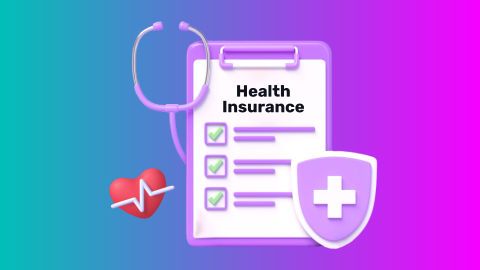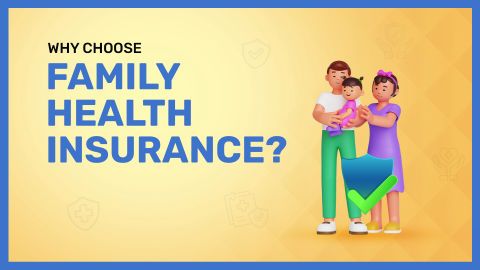Key features and benefits
-
Health coverage up to Rs. 50 lakh* with premiums starting at Rs. 1,469*
Buy health plans offered by our insurance partners with extensive coverage and affordable premiums.
-
Cashless treatment at 10,000+ hospitals
Our health insurance partners offer the convenience of cashless hospitalisation and treatment through a wide network of 10,000+ hospitals. Find your nearest network hospital here
-
Critical illnesses covered
Buy health insurance policies that provide coverage for chronic illnesses. Some of the illnesses covered include asthma, blood pressure, cholesterol, and diabetes.
-
Pre- and post-hospitalisation expenses covered
Get coverage for medical expenses incurred for up to 60 days before hospitalisation and 90 days after discharge. These days may vary as per the policy chosen.
-
Road ambulance coverage
Get coverage for ambulance expenses incurred for transporting the insured to the hospital. However, the service must be availed from a registered ambulance service provider.
-
Up to 527 daycare treatments covered
Avail coverage for up to 527 daycare treatments that require hospitalisation for less than 48 hours. The number of treatments may vary depending on your policy.
-
Coverage for medical checkups
Buy policies that cover the cost of your routine and periodic health checkups. Additionally, some policies also offer free health checkup facilities.
-
Income tax benefit
Get tax exemptions on premiums paid for health insurance policies as per the applicable tax laws.
Frequently asked questions
Several factors determine the premium of a health insurance policy. These include type of coverage, age of the proposer (applicant), medical history of the proposer, and more. Besides, if you take add-on covers, your premium will increase. You should choose a health insurance plan that adequately covers all your medical needs. This will ensure you are financially equipped to handle any medical emergency. Bajaj Finance offers various health insurance plans from top insurers with varying coverage and premium amount. Click here to access the health insurance plans.
Pre-existing diseases refer to one's medical history of illnesses. These include heart disease, asthma, cholesterol, thyroid, diabetes, or cancer. If one is already diagnosed with these diseases before buying any medical insurance plan, they are classified as pre-existing diseases.
Many health insurance providers do not cover pre-existing diseases under their plans. However, it also depends on the insurance provider and policy you choose. Some insurance providers cover pre-existing conditions but with a waiting period. During this period, you cannot raise claims for any treatment of pre-existing conditions. Depending on your health insurance provider, the waiting period may vary between 2-4 years.
The duration from buying the health insurance policy until you can claim the benefits is called a waiting period. The insurance company does not accept policy claims made during this block time.
Every insurance company has a waiting period. Different policy providers have different waiting periods. It also depends on the health insurance policy and may vary according to your health conditions, such as pre-existing diseases or critical illnesses. The waiting period for health insurance policies varies from 30 days to even 4 years. Policies that cover pre-existing conditions especially have a more extended waiting period. You need to know about the waiting period of the policy at the time of purchase to avoid any confusion in the future.
A deductible is an amount that a policyholder must pay in any medical emergency. The insurance provider will settle the remaining amount. For instance, if your policy's deductible is Rs. 10,000 and the claim by the policyholder is Rs. 40,000, then the insurance company will pay only Rs. 30,000.
Yes, you get tax benefit for premiums paid towards health insurance policy. You can apply for tax exemption under the relevant section of the Income Tax Act, 1961. All health insurance plans, from individual to family floater plans, qualify for the tax-deduction benefit, depending on the individual's age. The tax deductions are as mentioned below:
- For self and family (everyone below 60 years): Rs. 25,000
- For self, family, and parents (everyone below 60 years): Rs. 25,000 + Rs. 25,000
- For self and family (everyone below 60 years) and senior citizen parents: Rs. 25,000 + Rs. 50,000
- For self and family (eldest member above 60 years) and senior citizen parents: Rs. 50,000 + Rs. 50,000
Health insurance covers medical expenses and reduces taxes, saving you up to Rs. 31,200* under Section 80D of Income Tax Act, 1961.
Under an employer's group policy, the employer will purchase a group health insurance plan. The premium will depend on the number of members and the coverage offered. However, the employer's group medical insurance policy does not cover high-end medical expenses, expensive hospital beds, and more.
As such, you should purchase a separate health insurance plan. It allows you to get substantial coverage, no claim benefits, customisation options, and more such facilities offered by the policy.
Health insurance is a type of insurance that allows the insured to claim compensation for their medical expenses. This may include doctor's fees, medication, diagnostic tests, and hospitalisation expenses.
Almost all health insurance providers have designed and incorporated COVID-19 health insurance policies, including coverage for hospitalisation expenses under their offerings. Medical insurance companies also cover pre- and post-hospitalisation, in-patient and out-patient treatment, and home isolation treatment from the day of diagnosis. You must check with your insurer or read the policy terms and conditions to understand the claim process.
Yes, most health insurance policies covering COVID-19 have a waiting period, depending on your policy's terms and conditions. The waiting period may vary from the first 15 days to 30 days of buying the COVID-19 policy. During this period, your claims will not be accepted by your insurer. You can claim COVID-19 coverage after the waiting period is over. To know about the duration of your waiting period, you must contact your insurer.
Many medical insurance providers cover expenses for home care or home quarantine treatment if the doctor has advised home isolation. However, you must check with your insurer to know the terms and conditions of the policy chosen.
You can get individual health insurance online through the official website of your preferred insurance provider.
Yes, you can pay for health insurance monthly. But, check with your insurance provider regarding the availability of this facility.
Whether or not you want a separate health insurance policy when you are covered under a group policy depends on your preference. However, make a decision based on the coverage of your group policy. You can skip to a separate policy if it offers substantial coverage for major diseases and includes other benefits.
Cashless hospitalisation means that if you visit any network hospitals registered with your insurance provider, you need not pay anything for receiving treatment.
Yes, if the policy you are purchasing requires you to go through any medical checkup, you need to complete that to be eligible for it.








